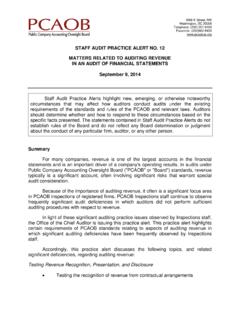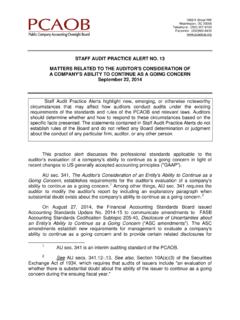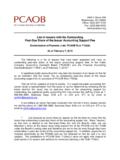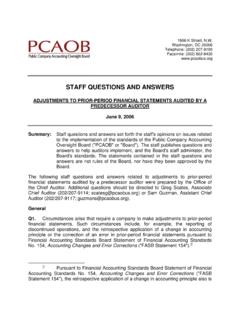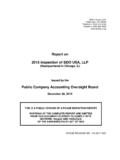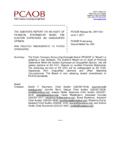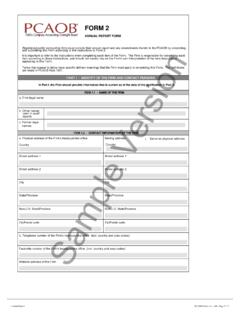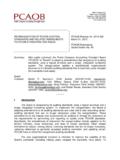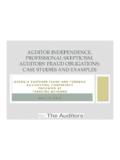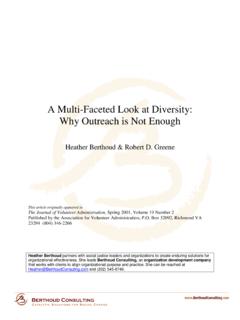Transcription of STAFF AUDIT PRACTICE ALERT NO 8 - PCAOB
1 1666 K Street, NW Washington, 20006 Telephone: (202) 207-9100 Facsimile: (202)862-8430 STAFF AUDIT PRACTICE ALERT NO. 10 MAINTAINING AND APPLYING PROFESSIONAL SKEPTICISM IN AUDITS December 4, 2012 STAFF AUDIT PRACTICE Alerts highlight new, emerging, or otherwise noteworthy circumstances that may affect how auditors conduct audits under the existing requirements of the standards and rules of the PCAOB and relevant laws. Auditors should determine whether and how to respond to these circumstances based on the specific facts presented. The statements contained in STAFF AUDIT PRACTICE Alerts do not establish rules of the Board and do not reflect any Board determination or judgment about the conduct of any particular firm, auditor, or any other person.
2 Executive Summary Professional skepticism is essential to the performance of effective audits under Public Company Accounting Oversight Board (" PCAOB " or "Board") standards. Those standards require that professional skepticism be applied throughout the AUDIT by each individual auditor on the engagement team. PCAOB standards define professional skepticism as an attitude that includes a questioning mind and a critical assessment of AUDIT evidence. The standards also state that professional skepticism should be exercised throughout the AUDIT process. While professional skepticism is important in all aspects of the AUDIT , it is particularly important in those areas of the AUDIT that involve significant management judgments or transactions outside the normal course of business.
3 Professional skepticism also is important as it relates to the auditor's consideration of fraud in an AUDIT . When auditors do not appropriately apply professional skepticism, they may not obtain sufficient appropriate evidence to support their opinions or may not identify or address situations in which the financial statements are materially misstated. Observations from the PCAOB 's oversight activities continue to raise concerns about whether auditors consistently and diligently apply professional skepticism. Certain circumstances can impede the appropriate application of professional skepticism and allow unconscious biases to prevail, including STAFF AUDIT PRACTICE ALERT No.
4 10 December 4, 2012 Page 2 incentives and pressures resulting from certain conditions inherent in the AUDIT environment, scheduling and workload demands, or an inappropriate level of confidence or trust in management. AUDIT firms and individual auditors should be ALERT for these impediments and take appropriate measures to assure that professional skepticism is applied appropriately throughout all audits performed under PCAOB standards. Firms' quality control systems can help engagement teams improve the application of professional skepticism in a number of ways, including setting a proper tone at the top that emphasizes the need for professional skepticism; implementing and maintaining appraisal, promotion, and compensation processes that enhance rather than discourage the application of professional skepticism; assigning personnel with the necessary competencies to engagement teams.
5 Establishing policies and procedures to assure appropriate AUDIT documentation, especially in areas involving significant judgments; and appropriately monitoring the quality control system and taking necessary corrective actions to address deficiencies, such as, instances in which engagement teams do not apply professional skepticism. The engagement partner is responsible for, among other things, setting an appropriate tone that emphasizes the need to maintain a questioning mind throughout the AUDIT and to exercise professional skepticism in gathering and evaluating evidence, so that, for example, engagement team members have the confidence to challenge management representations.
6 It is also important for the engagement partner and other senior engagement team members to be actively involved in planning, directing, and reviewing the work of other engagement team members so that matters requiring AUDIT attention, such as unusual matters or inconsistencies in AUDIT evidence, are identified and addressed appropriately. It is the responsibility of each individual auditor to appropriately apply professional skepticism throughout the AUDIT , including in identifying and assessing the risks of material misstatement, performing tests of controls and substantive procedures to respond to the risks, and evaluating the results of the AUDIT .
7 This involves, among other things, considering what can go wrong with the financial statements, performing AUDIT procedures to obtain sufficient appropriate AUDIT evidence rather than merely obtaining the most readily available evidence to corroborate management's assertions, and critically evaluating all AUDIT evidence regardless of whether it corroborates or contradicts management's assertions. The Office of the Chief Auditor is issuing this PRACTICE ALERT to remind auditors of the requirement to appropriately apply professional skepticism throughout their audits. The timing of this release is intended to facilitate firms' emphasis in upcoming calendar year-end audits, as well as in future audits, on STAFF AUDIT PRACTICE ALERT No.
8 10 December 4, 2012 Page 3 the importance of the appropriate use of professional skepticism. Due to the fundamental importance of the appropriate application of professional skepticism in performing an AUDIT in accordance with PCAOB standards, the PCAOB also is continuing to explore whether additional actions might meaningfully enhance auditors' professional skepticism. Professional Skepticism and Due Professional Care Professional skepticism, an attitude that includes a questioning mind and a critical assessment of AUDIT evidence, is essential to the performance of effective audits under PCAOB standards.
9 The AUDIT is intended to provide investors with an opinion on whether the financial statements prepared by company management are presented fairly, in all material respects, in conformity with the applicable financial reporting framework. If the AUDIT is conducted without professional skepticism, the value of the AUDIT is impaired. The auditor has a responsibility to plan and perform the AUDIT to obtain reasonable assurance about whether the financial statements are free of material misstatement, whether caused by error or This responsibility includes obtaining sufficient appropriate evidence to determine whether the financial statements are materially misstated rather than merely looking for evidence that supports management's PCAOB standards require the auditor to exercise due professional care in planning and performing the AUDIT and in preparing the AUDIT report.
10 Due professional care requires the auditor to exercise professional skepticism. PCAOB standards define professional skepticism as an attitude that includes a questioning mind and a critical assessment of AUDIT evidence. PCAOB standards require the auditor to exercise professional skepticism throughout the While professional skepticism is important in all aspects of the AUDIT , it is particularly important in those areas of the AUDIT that involve significant 1/ Paragraph .02 of AU sec. 110, Responsibilities and Functions of the Independent Auditor.

